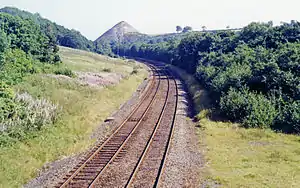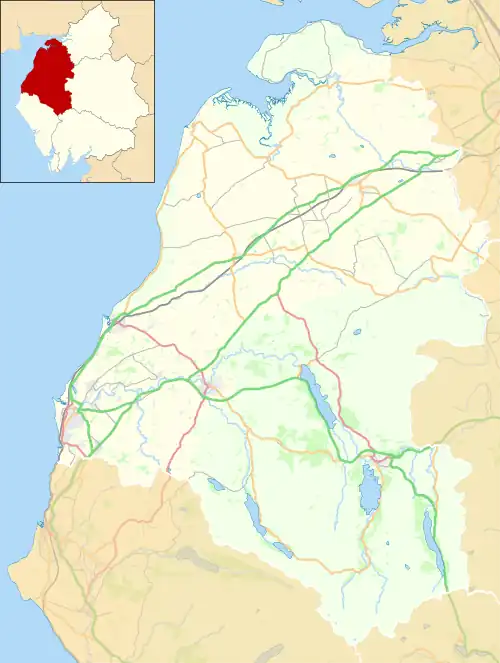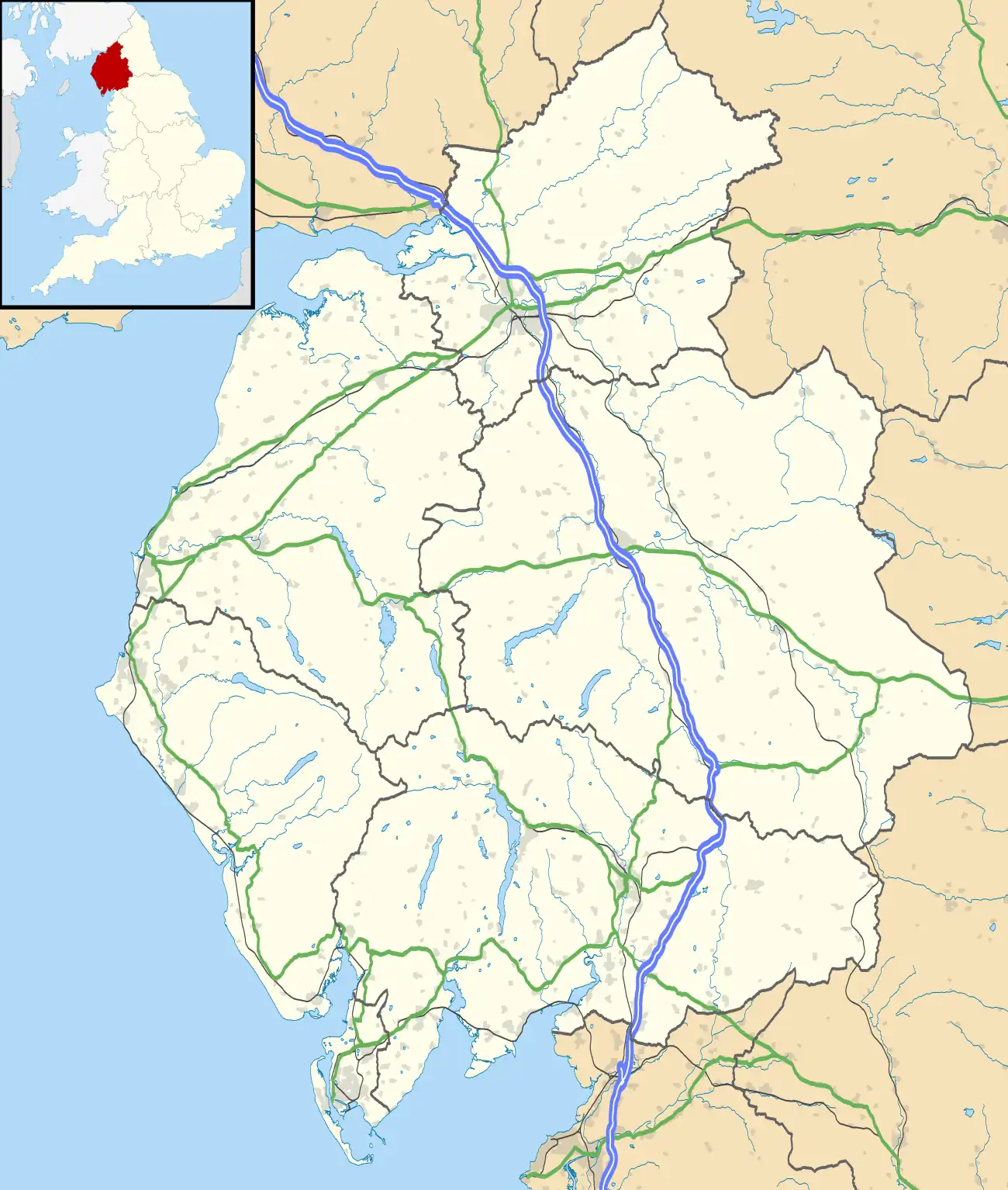Dearham Bridge railway station
Dearham Bridge was a railway station on the Maryport and Carlisle Railway (M&CR) serving the village and rural district of Dearham in Cumberland (now in Cumbria), England. The station was opened by the M&CR in 1842 as Dearham, but was renamed Dearham Bridge in 1867 when the M&CR opened a station in the village of Dearham, to which it gave that name. Dearham Bridge station lay in the Parish of Crosscanonby.[4]
Dearham Bridge railway station | |
|---|---|
 Site of the station in 1991 | |
| General information | |
| Location | Dearham, Cumberland England |
| Coordinates | 54.721704°N 3.444958°W |
| Grid reference | NY07043727 |
| Platforms | 2 (staggered) |
| Other information | |
| Status | Disused |
| History | |
| Original company | Maryport & Carlisle Railway |
| Post-grouping | London Midland and Scottish Railway |
| Key dates | |
| 1842 | Opened |
| 1867 | Renamed Dearham Bridge |
| 5 June 1950 | Station closed to passengers[1][2] |
| 12 October 1951 | Station closed completely[3] |
| Location | |
Maryport and Carlisle Railway | |||||||||||||||||||||||||||||||||||||||||||||||||||||||||||||||||||||||||||||||||||||||||||||||||||||||||||||||||||||||||||||||||||||||||||||||||||||||||||||||||||||||||||||||||||||||||||||||||||||||||||||||||||||||||||||||||||||||||||||||||||||||
|---|---|---|---|---|---|---|---|---|---|---|---|---|---|---|---|---|---|---|---|---|---|---|---|---|---|---|---|---|---|---|---|---|---|---|---|---|---|---|---|---|---|---|---|---|---|---|---|---|---|---|---|---|---|---|---|---|---|---|---|---|---|---|---|---|---|---|---|---|---|---|---|---|---|---|---|---|---|---|---|---|---|---|---|---|---|---|---|---|---|---|---|---|---|---|---|---|---|---|---|---|---|---|---|---|---|---|---|---|---|---|---|---|---|---|---|---|---|---|---|---|---|---|---|---|---|---|---|---|---|---|---|---|---|---|---|---|---|---|---|---|---|---|---|---|---|---|---|---|---|---|---|---|---|---|---|---|---|---|---|---|---|---|---|---|---|---|---|---|---|---|---|---|---|---|---|---|---|---|---|---|---|---|---|---|---|---|---|---|---|---|---|---|---|---|---|---|---|---|---|---|---|---|---|---|---|---|---|---|---|---|---|---|---|---|---|---|---|---|---|---|---|---|---|---|---|---|---|---|---|---|---|---|---|---|---|---|---|---|---|---|---|---|---|---|---|---|---|
| |||||||||||||||||||||||||||||||||||||||||||||||||||||||||||||||||||||||||||||||||||||||||||||||||||||||||||||||||||||||||||||||||||||||||||||||||||||||||||||||||||||||||||||||||||||||||||||||||||||||||||||||||||||||||||||||||||||||||||||||||||||||
History
Dearham Bridge station was opened by the Maryport & Carlisle Railway (M&CR) in 1840. At grouping in 1923 the M&CR became a part of the London, Midland and Scottish Railway. It was one of several lightly used intermediate stations on this route to be closed (in 1950) by the British Transport Commission in the years immediately after the nationalisation of the UK railway network. No trace of the station now remains, but the main Carlisle-Maryport line (completed in 1845) remains open and forms part of the Cumbrian Coast Line between Carlisle and Barrow in Furness. Branch lines here served Lowther Pit, Lonsdale Pit, Nelson Pit on Broughton Moor, Bertha Pit, etc.[4]
In the 19th century coal was brought down a tramway from pits on Broughton Moor and transferred to M&CR trains at the station.[5]
The station is known for a haunting related to a man who threw his new-born child under a train here, killing the infant. Now, as a train is about to enter the tunnel, the child can occasionally be heard screaming before being hit. The father was hanged for the crime.[6]
The Birkby Fire Brick Works and Colliery was nearby, worked by Messrs. Steele and Beveridge, of Maryport; it gave employment to about forty people.[7]
See also
References
- Robinson 2002, p. 43.
- Quick 2009, p. 146.
- Robinson 1995, p. 184.
- Old Cumbria Gazetteer Retrieved : 3 September 2012
- Robinson 1985, p. 59.
- Paranormal Database Retrieved : 3 September 2012
- Cross Canonby Retrieved : 3 September 2012
Sources
- Quick, Michael (2009) [2001]. Railway passenger stations in Great Britain: a chronology (4th ed.). Oxford: Railway & Canal Historical Society. ISBN 978-0-901461-57-5. OCLC 612226077.
- Robinson, Peter W. (2002). Cumbria's Lost Railways. Stenlake Publishing. ISBN 1-84033-205-0.
- Robinson, Peter W. (August 1995). Peascod, Michael (ed.). "Maryport & Carlisle 150". Cumbrian Railways. Pinner: Cumbrian Railways Association. 5 (12). ISSN 1466-6812.
- Robinson, Peter W. (1985). Railways of Cumbria. Clapham, via Lancaster: Dalesman Books. ISBN 0-85206-815-8.
- Further reading
- Jowett, Alan (March 1989). Jowett's Railway Atlas of Great Britain and Ireland: From Pre-Grouping to the Present Day (1st ed.). Sparkford: Patrick Stephens Ltd. ISBN 978-1-85260-086-0. OCLC 22311137.
- Jowett, Alan (2000). Jowett's Nationalised Railway Atlas (1st ed.). Penryn, Cornwall: Atlantic Transport Publishers. ISBN 978-0-906899-99-1. OCLC 228266687.
External links
- The station on an Edwardian OS map, via National Library of Scotland
- The station on the coast line, with mileages, via Railway Codes
- The station on an old O.S. Map via npemaps
| Preceding station | Historical railways | Following station | ||
|---|---|---|---|---|
| Bullgill Station closed, line open |
Maryport & Carlisle Railway Maryport and Carlisle Railway |
Maryport Station open, line open | ||

